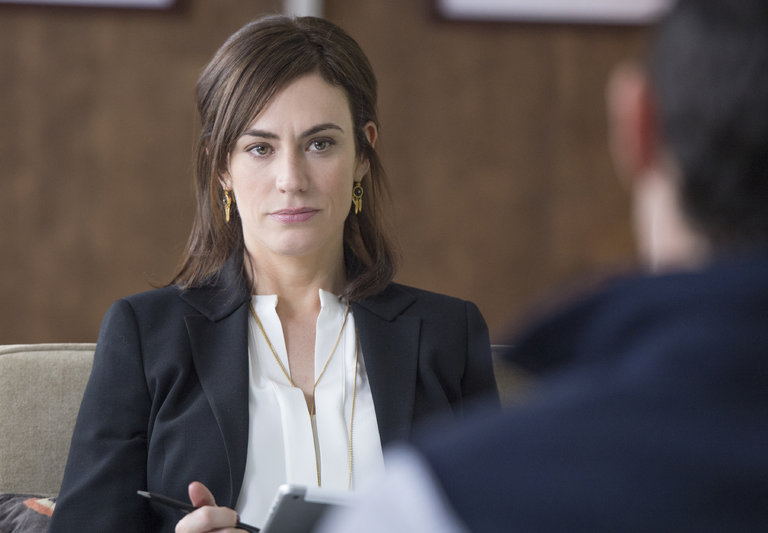I’ve heard several portfolio managers say they wish they could find someone like Wendy Rhoades, performance coach extraordinaire on the wonderful TV show Billions. With the TV show about to launch it’s second season, I thought it would be a good time (and fun) to offer a professional critique of Wendy’s technique. Bottom line–she’s not bad. Especially later in Season 1, she shows how unconscious motivations can lead to very costly decisions, and more importantly how reflection and self awareness of the emotions involved in critical decisions can potentially avoid costly mistakes. Below is the text of a blog post I wrote for Huffington Post, which you can read on HuffPo here.


Just how good is Wendy Rhodes? She’s described by her admirers as “the best performance coach in the business”. I thought the launch of Season 2 of Billions might be a good time for a performance review for Wendy herself.
Showtime, the cable network home of Billions, where Wendy plies her trade, describes her as
“A psychiatrist by trade, Wendy Rhodes combines an avid intellect with a keen understanding of human nature. She used those skills to help Bobby Axelrod build his edge run from the ground up and now works as the company’s star in-house performance coach.”
Until the prequel, we have to take Bobby’s word for it that Wendy helped him build his hedge fund from the ground up. I’m not going to quibble with an “avid intellect” and a “keen understanding of human nature.”
Like Wendy, I’m a psychiatrist, do performance coaching and business consulting. Foregoing modesty, I will describe myself as also having an avid intellect, and share her keen understanding of human nature. I thought viewers might appreciate an assessment of the quality of Wendy’s work. I don’t think Wendy would mind. Peer consultation and supervision is a standard tool psychiatrists and analysts make use of to keep us on our toes. We use colleagues to help us overcome blind spots and check for systematic errors. Not unlike a how a good performance coach can help an investor!
Wendy calls the people she works with “patients” —a mistake in my opinion, for lots of reasons. They are her clients, or more correctly Axe Capital is her client. One hopes she doesn’t prescribe medication if they get clinically depressed, or for their ADHD, and that when they need therapy—for relationship problems, significant anxiety or depression, or anything outside the field of their investment performance– she refers them to a competent colleague for confidential treatment outside the transparent walls of Axe capital. I’m sure she would agree.
How good is her technique and skill when actually working with a client? To my eye it ranges from pretty cheesy to not-too-bad (Pilot, Season 1) to pretty damn good (Season 1, Episode 11).
In the pilot we see Wendy at work in two “sessions” (Personally I’d call them meetings. This is business. It’s like therapy, but it’s not therapy).

Mick Danzig, played by Nathan Darrow, has scheduled an appointment because he feels he’s “lost his mojo”. Everyone else in the firm is up double digits, and he’s down 4%. He’s lost his confidence, wonders if he’s depressed and needs some Prozac (or something). After asking a few good and important questions (is he sleeping, eating, exercising, having sex, ok at home?) Wendy firmly announces that he doesn’t need medication—he needs to believe in himself again. She says he’s listening to the “wrong voice”—the loud one telling him he’s “just fucking stupid” rather than the quiet one inside that is telling him “where the alpha is.”
Using the word “alpha” correctly in a sentence immediately identifies Wendy as a true insider. I’m not going to try, but suffice it to say that being good at “finding where the alpha is” is what makes you a superstar, and a lot of money. Wendy makes Mick stand up and “confess” that he made 7.2 million last year. She insists he’s got to FEEL that power inside. There’s some chest pounding and impassioned encouragement. Wendy tells Mick forcefully that he’s among the elite— “you’re in the special forces here—you are a Navy SEAL—Did the SEALS make a mistake signing you up? No the SEALS don’t make mistakes! So get out there and do what needs to be done!”
This is kind of clever. Wendy appeals to Mick’s narcissism (“you’re part of the elite”) while simultaneously reminding him of a broader network of authority and brotherhood (the SEALs) that has decided he’s of value so he doesn’t need to make his own decision about himself. In a sense he can lean on the group identification while he regains his balance.
Mick leaves looking decidedly perkier, returning later in the episode with a good bet that earns Bobby’s approval, millions for the firm, and a shy grateful smile for Wendy.
With Mick, Wendy is using the tools of suggestion and motivational exhortation. She uses the force of her own personality and alleged belief in Mick (I didn’t find this entirely convincing) to transfer some energy and confidence into him. I’d call this good old sports coaching and not much more sophisticated than a talented high school football coach. Clever in parts, this session is fraught with manipulation and suggestion, and contains no help for Mick that will foster self-awareness or growth.
Contrast it with an encounter in the pilot between Wendy and Bobby. Bobby is wrestling with an impulse to buy an extraordinarily lavish and expensive house. He tells Wendy that he knows that buying the beach mansion will “unleash the hounds” (of envy and criticism) and that “makes me want it even more”. Wendy congratulates him for understanding the motivation before he makes the purchase, saying that he’s come a long way since they first started working together— “You wouldn’t have recognized the motivation until after the fact”. She’s underlining that through their work he’s increased his capacity for self-reflection, gained knowledge about his own motivation and developed a greater ability to delay action in favor of reflective thought. Wendy leaves him with the thought that understanding is still not enough—he also needs to exercise control. Axe says he has no one else to talk to like this, and that’s undoubtedly true. Wendy is working at a much more sophisticated level here compared to her session with Mick. There’s an ongoing process with Bobby, where they’re working on his capacity to be reflective and self-aware and use that to make better decisions (i.e. exercise control when needed). After praising Wendy for her contribution to his greater self-awareness and self-control, Bobby gets provoked by her husband Chuck and knowingly overrides his self-awareness, giving in to the impulse to buy the house.
Fast forward to Season one, Episode 11—Bobby has just made a colossal mistake on a company. Deliberately ignoring the warnings of his entire staff of analysts, he places an enormous bet that leads to a loss of hundreds of millions of dollars. Impressively (maybe we have Wendy to thank for this) he doesn’t blame anyone, but immediately knows that the misjudgment arose from his head, not a miscalculation of the market, and asks Wendy for an emergency meeting. In a long, intimate conversation (that Wendy’s husband observes and mistakenly imagines to be romantic or sexual) the two of them explore the “mistake”. Wendy keeps bringing Bobby back to Donny, his long time friend and co-worker who has recently died (with a very complicated backstory). The viewer knows, but Wendy doesn’t, that Bobby has a secret reason to feel guilty about Donny’s death—for his own gain, he withheld information about potential treatment that could have prolonged Donny’s life.
Nevertheless, Axe has plenty of other things to feel guilty about. He admits to Wendy that he felt relief when Donny died; that if he felt any sadness it was deeply buried. He admits his greatest fear to Wendy—could he be a sociopath, someone who doesn’t have the capacity to feel? With great insight and compassion, I thought, Wendy tells him that he showed his guilt by blowing the bet—punishing himself via both the financial loss and the humiliation in front of his people. She points out that a normal person wouldn’t engage in the behavior he does—but a sociopath wouldn’t care about the consequences. He comes back with a penetrating observation about himself and Wendy — that neither of their “wires” are where they should be—they’re both outliers.
This encounter is moving and effective as drama, and also good TV psychoanalysis. Together Wendy and Bobby explore the way unconscious feelings—in this case guilt—can lead to apparently irrational decisions. But there is a psychic logic to Bobby’s action. Unconscious guilt led to a need to punish himself which led to the bad bet which “fixed” the psychological problem. This is the real deal, and shows how unconscious motives can cause terrible mistakes in business. The process also offers the hope that when making consequential decisions, a deeper understanding of one’s psychology including unconscious feelings and fantasies, could actually prevent costly repeated mistakes.
Wendy is identified from the outset as a psychiatrist, but this later work with Bobby makes it clear that her orientation is at least in part psychoanalytic. She listens in an analytic way, hearing not just the words but the spaces between, the evasions and changes of topic, showing that sometimes the “negative space” in a conversation points to the most important issues. And she uses her understanding of the unconscious and its link to motivation and choice to powerful effect. She was great.
A few details in the series made me squirm. That’s a problem all professionals face, I think, when they see dramatic representations of their work. The departures from real life practice, whether done out of ignorance by the writers and producers, or more probably for dramatic purposes, are ridiculously painful. I want to yell at Wendy for being so stupid about her supposedly confidential notes—for one thing they were dumb and unnecessary, and for another, leaving them on her laptop on bed at home was inexcusable. Couldn’t the writers have found another way to give Chuck a shot at Bobby without such a dumb violation of professional practice? Wendy should have known enough to keep no notes at all.
OK, and I have to say something about her clothes. Black leather leggings in the pilot, some low cut tops later on. A little too sexy, but more importantly too intrusive into the relationships she’s engaged in. She also works a little too hard to maintain control of the physical space—for example, forcing Bobby to come to the “patient” chair before she’ll begin their “session”. She’s forcing people to pay attention to her and acknowledge her power —my read is rather than demonstrating her power with these moves, she’s showing a bit of lack of confidence. She’s trying a little too hard, I think, to prove she’s as powerful as the boys. And all along, they’re desperate for her attention and care.
Compared to other television and film psychiatrists, Wendy’s awfully damn good.



 g from some women, outrage from some men.
g from some women, outrage from some men. From the moment you enter a position of power, you’ll be a target held responsible for everyone’s hopes, demands and disappointments. You can’t meet all these needs, so you will be attacked from time to time. When this happens, it’s inevitable to feel hurt, and a little psychologically disorganized, so get help from a trusted advisor about whether or how to respond.
From the moment you enter a position of power, you’ll be a target held responsible for everyone’s hopes, demands and disappointments. You can’t meet all these needs, so you will be attacked from time to time. When this happens, it’s inevitable to feel hurt, and a little psychologically disorganized, so get help from a trusted advisor about whether or how to respond.
